Alumni College
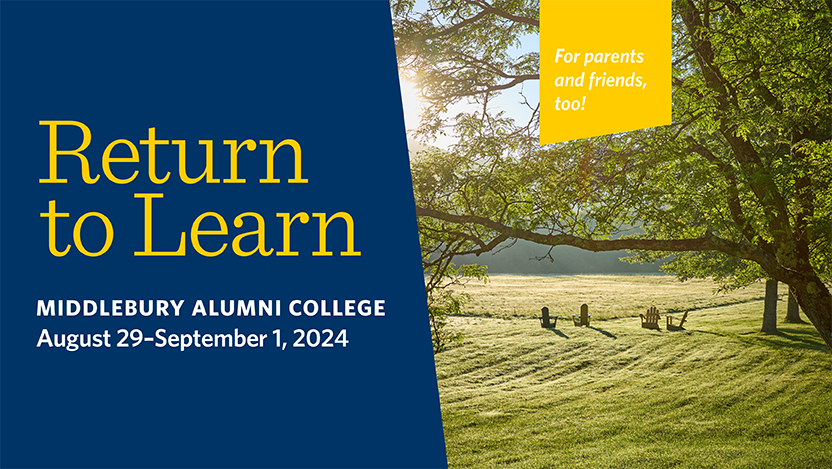
Join old friends and new in this beloved Middlebury tradition!
Return to Learn at Alumni College!
Learn from some of the College’s finest faculty while enjoying delicious meals and spectacular views on our Bread Loaf campus.
This year’s Alumni College takes place August 29–September 1, 2024.
Event Highlights
- A visit from President Patton
- Cocktail hours outside the Little Theater
- Movie Night!
- Conversations over meals and evening receptions
- And five courses taught by some of Middlebury’s finest instructors
More details are available on the Schedule page.
Pricing
| With Lodging | Without Lodging | Wed Arrival w/Lodging |
|---|---|---|
| $625 | $500 | $700 |
ADA Accommodations
The Disability Resource Center (DRC) provides a range of supportive accommodations for students with disabilities at Middlebury. For ADA accommodations, please reach out to the DRC staff at ada@middlebury.edu.
Questions?
Email us at alumni@middlebury.edu or call the Alumni Office at 802-443-5183.
Course Descriptions
David and Demon: Dickens, Then and Now
Barbara Black
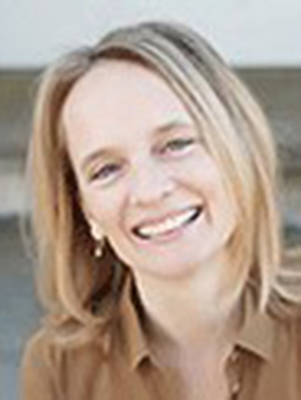
*This course is now full.*
Our course focuses on a conversation underway between two remarkable novels, across the centuries and across continents: Charles Dickens’s David Copperfield, which he affectionately called his “favorite child,” and Barbara Kingsolver’s Pulitzer Prize–winning Demon Copperhead. Why read Dickens now? Why rewrite him? What are the enduring social challenges and philosophical questions that preoccupied him? Further, what can we learn from studying both his craft and his legacy?
As we encounter the exuberant imaginations of two enthralling storytellers, we will explore the shared concerns of Dickens and Kingsolver, including home and belonging, greed and poverty, socioeconomic class and justice, family and identity, and growing up and experiencing love despite the threat of failing to thrive.
Economics and Gender
Tanya Byker
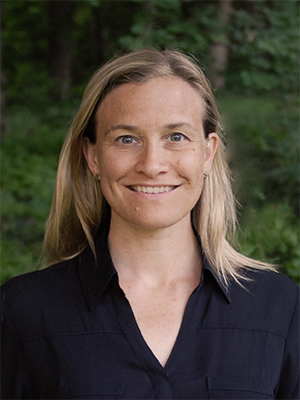
This course introduces students to using the tools of economics to understand gender-related issues. In the first part of the course, we will review economic models of the household, fertility, and labor supply and discuss how they help us interpret long-term trends in marriage and divorce, fertility, and women’s labor force participation.
In the second part of the course, we will study economic models of wage determination and focus on explanations of, and policy remedies for, earnings differentials by gender.
Some of the questions we will tackle: How does the family function as an economic unit? How do individuals allocate time between the labor market and the household? How have changes in family structure affected women’s employment, and vice versa? What are possible explanations for gender differences in education, labor force participation, occupational choice, and earnings? What is the role of government in addressing gender issues in the home and the workplace?
The Science of Exercise and Anti-Aging
Robert Cluss
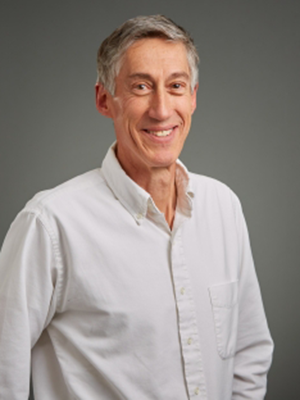
*This course is now full.*
Aging is inevitable. Lifespans are finite. Popular culture is replete with lifestyle strategies, diets, drugs, natural remedies, instructional videos, anti-aging supplements—all just clicks away—to help us achieve our lifestyle goals. What action can we take to improve the quality and quantity of our time together?
The data consistently demonstrate that the anti-aging benefits that result from exercise are the most powerful—including improvements in strength, metabolism, mood, muscle tone, cardiovascular health, bone density, sleep, and cognition.
Through lectures, readings, case studies, and discussion, we will consider what the evidence-based research tells us about the science of exercise and where the controversies lie. We will delve into what happens on the macro and micro levels and consider the things that we can control and those we cannot.
Executive Power in the Founders’ Constitution and the American Constitution Today
Murray Dry
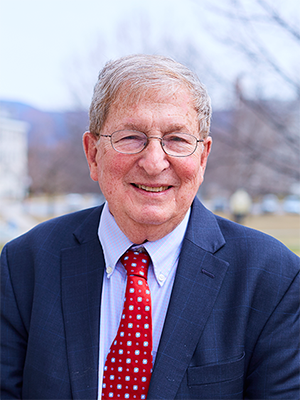
*This course is now full.*
In this course, our aim will be to understand how the constitutional separation of powers was intended to work, how it works today, and whether any changes, constitutional or statutory, are needed.
We will read substantial parts of James Madison’s Notes on the Federal Convention and some essays from the ratification debates, with an emphasis on the creation of the presidency, the office possessing “the executive power.” We will also study post-ratification debates and subsequent constitutional developments over the administration of government and foreign affairs. We will then examine the president’s amenability to the judicial process, in the civil and the criminal contexts.
Putinism and Russian Culture
Matthew Walker
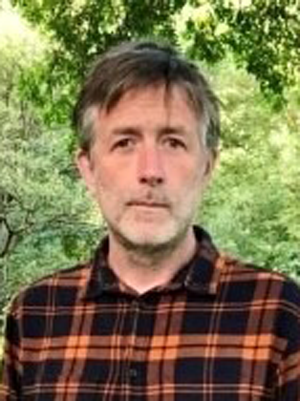
*This course is now full.*
The collapse of the Soviet Union in 1991 was widely hailed in the West as a triumph of liberal democracy over totalitarianism, and for some observers it even signaled the end of history as such. Today, however, that narrative itself seems like history, as Russia wages a brutal war of aggression against Ukraine and descends into fascism at home. What happened?
This course will seek to understand this reversal of vectors from within Russian culture. Together we will engage in close analysis of various forms of cultural production, especially cinema, and take measure of some of the different ways Russians have responded to the legacies of their past and the politics of their present.
Faculty
Barbara Black (David and Demon: Dickens, Then and Now)
Barbara Black is professor of English and Tisch Chair in Arts and Letters at Skidmore College, where she has received the Ciancio Award for Excellence in Teaching. She is the author of On Exhibit (Virginia 2000), A Room of His Own (Ohio 2012), and Hotel London (Ohio State 2019) and is a coeditor of Olive Schreiner’s Dreams (Broadview 2020). Black’s essays have appeared in such venues as Victorian Poetry, Dickens Studies Annual, and Salmagundi. She has served on the Interdisciplinary Nineteenth-Century Studies board and as book review editor of Nineteenth-Century Contexts. She currently serves on the Editorial Advisory Committee for PMLA. AB, Bryn Mawr College; MA, PhD, University of Virginia.
Tanya Byker (Economics and Gender)
Tanya Byker is an associate professor of economics at Middlebury College. Her research falls in the areas of labor and development economics under the umbrella of economics and gender. As an applied micro economist, she uses data analysis to explore the interrelated choices individuals and households make about education, work, and fertility. She is particularly interested in how the policy environment people face shapes or constrains their behavior. The policy contexts she has examined span paid leave, reproductive health, and, most recently, the environment.
Byker earned a BA with honors in economics and philosophy from Swarthmore College in 1994. In 2014, she earned a PhD in economics from the University of Michigan.
Robert Cluss (The Science of Exercise and Anti-Aging)
Bob Cluss is a professor in the Department of Chemistry and Biochemistry and Program in Molecular Biology and Biochemistry. He first joined the Middlebury College faculty in 1986 as a visiting assistant professor. After three years at San Jose State University, he returned to Middlebury in 1990.
Bob served as the dean of curriculum and director of the sciences from 2004 to 2014, when he cofounded the popular global health minor. During the past 38 years, he has created and delivered 24 different courses in biochemistry, chemistry, cell biology, microbiology, emerging infectious diseases, chemical and biological warfare, and, most recently, exercise biochemistry.
His NIH-supported research group has investigated aspects of metabolism of Borrelia burgdorferi, the Lyme disease pathogen, and included about 130 different students who have progressed on to successful careers in teaching, research, and medicine. He is also an avid cyclist and last summer completed a five-day perimeter ride of Vermont.
Murray Dry (Executive Power in the Founders’ Constitution and the American Constitution Today)
Murray Dry, Charles A. Dana Professor of Political Science, teaches courses in political philosophy, American political thought, and American constitutional law. He has written two books (Civil Peace and the Quest for Truth: The First Amendment Freedoms in Political Philosophy and American Constitutionalism, Lexington Books 2004; and Same Sex Marriage and American Constitutionalism: A Study in Federalism, Separation of Powers and Individual Rights, Paul Dry Books 2017) and numerous articles and book chapters on American constitutionalism.
Matthew Walker (Putinism and Russian Culture)
Matthew Walker is assistant professor of Russian at Middlebury College, where he teaches courses on Russian language, literature, and culture. He earned his PhD in Slavic languages and literatures from the University of Wisconsin-Madison and, before coming to Middlebury, held positions at UPenn, Stanford, and Brown.
He has published articles on the Russian American writer Vladimir Nabokov and on Nikolai Gogol, a Ukrainian subject of the Russian Empire and the author of Dead Souls. He is currently at work on two book projects, one on the history of Gogol in 20th-century literary criticism, the other on genealogies of Putinism in Russian culture.
Alumni and Families
700 Exchange St.
Middlebury, VT
05753

